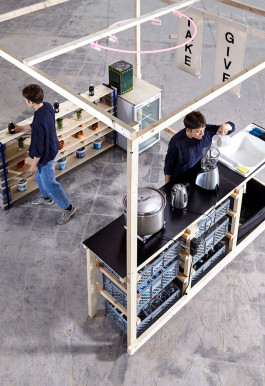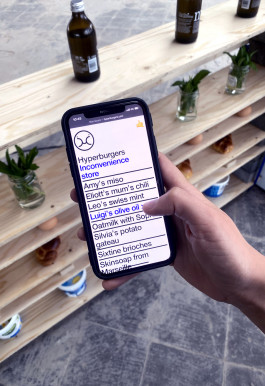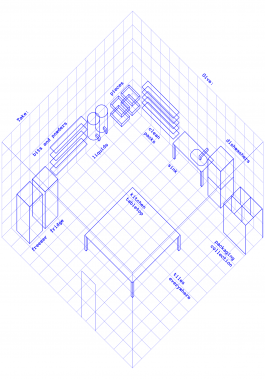Hyperburgers
Inconvenience Store
Welcome

to a supermarket entirely run by consumers, filled with self-organized food. There’s no middle man here: we supply and pay each other directly. The shop does not apply any surcharge on the goods, but asks us to give or make something, in the form of food, packaging, time or skills.
Hyperburgers as the graduation thesis for the Social Design master at Design Academy Eindhoven, 2021. Photography by Femke Reijerman.
Goods
In this store, it’s the consumers themselves who stock the shelves — with products that can be self-grown, self-made, self-supplied, self-salvaged, or self-repackaged.
Maybe you’re leaving town and the fridge is full of leftovers. Or know a bakery that would gladly donate the unsold bread at the end of the day. You might grow your own rosemary and sage, or be a member of the permaculture garden outside town. Perhaps you love to knead and bake your stress away every week — or month. You may be the master of vegan mayo, or the queen of babaganoush. Or you happen to have become a wise foragers, a dope fermenter, a passionate seed collector. You might know a small producer from back home, who makes premium extra virgin olive oil and sells it at a fair price. And maybe you’re not into elaborate cooking, but very much into good eating. Perhaps you can't help collecting jars, keep your wine corks, wash your yoghurt baskets, fold your paper bags. You can bring those too — we’ll wash and reuse them.

Money

When the food is not sourced and/or offered for free, we refund each other directly through p2p payment systems or directly with cash.
If it's leftovers, you might just want to share them for free. If you are supplying the group from a producer you know, you can make a crowdfund, or buy in bulk and distribute later. We refund each other the monetary costs of the ingredients and shipping that we have to pay to provide the food to the community. On top of that, a Berlin-style tip of 10-15% is customary. What we don't do, is applying profit margin on each other. But then you'll ask: what's the incentive to do all of this work? Read further.
Take&Make
There's no middle man here and the shop is non-profit. There’s only one golden principle: to be able to buy anything, we need to give or make something for the shop in a non-monetary form, be it food, time, skills or packaging.
The profit margin is replaced with karma-points called Đumplings. Every culture and country can name the Đumplings in their own folded food way: Knödel, Ravioli, Jiaozi... The name changes but the system is the same. To "mine" Đumplings participants can dedicate some of their time to the shop, in the tradition of time banks. Eventually, the price tag will be made of two currencies: fiat currency (€,£,$) + Đ. The amount and quality of the doing is flexible. It can be as small as a cork, a rubber band, a glass jar from your kitchen. It can be a little bit of our your time, to wash packaging, to organize the shop, bottle some oil, or more time, like help cooking. Obviously, it can be as big as starting a new food operation, or developing a new machinery. The value of Đumplings is defined and redefined periodically by the community.

Space

Hyperburgers is not a e-shop. It's a physical space, either offered by the philantropic agents in the territory (associations, foundations, autonomous spaces, neighborhood's centers) or obtained with a crowd-rent campaign.
The shop aims at fairly using vacant spaces in order to provide to citizens a place for a daily and communal kind of sustainability, one that tackles at once the environmental, the economical and the psychological aspects of consumption. In a Hyperburgers, pre-exhisting practices can juxtapose and new protocols can be experimented.
Hyperburgers
Inconvenience Store
Welcome
to a supermarket entirely run by consumers, filled with self-organized food. There’s no middle man here: we supply and pay each other directly. The shop does not apply any surcharge on the goods, but asks us to give or make something, in the form of food, packaging, time or skills.

Hyperburgers as the graduation thesis for the Social Design master at Design Academy Eindhoven, 2021. Photography by Femke Reijerman.
Goods
In this store, it’s the consumers themselves who stock the shelves — with products that can be self-grown, self-made, self-supplied, self-salvaged, or self-repackaged.
Maybe you’re leaving town and the fridge is full of leftovers. Or know a bakery that would gladly donate the unsold bread at the end of the day. You might grow your own rosemary and sage, or be a member of the permaculture garden outside town. Perhaps you love to knead and bake your stress away every week — or month. You may be the master of vegan mayo, or the queen of babaganoush. Or you happen to have become a wise foragers, a dope fermenter, a passionate seed collector. You might know a small producer from back home, who makes premium extra virgin olive oil and sells it at a fair price. And maybe you’re not into elaborate cooking, but very much into good eating. Perhaps you can't help collecting jars, keep your wine corks, wash your yoghurt baskets, fold your paper bags. You can bring those too — we’ll wash and reuse them.

Money

When the food is not sourced and/or offered for free, we refund each other directly through p2p payment systems or directly with cash.
If it's leftovers, you might just want to share them for free. If you are supplying the group from a producer you know, you can make a crowdfund, or buy in bulk and distribute later. We refund each other the monetary costs of the ingredients and shipping that we have to pay to provide the food to the community. On top of that, a Berlin-style tip of 10-15% is customary. What we don't do, is applying profit margin on each other. But then you'll ask: what's the incentive to do all of this work? Read further.
Take&Make
There's no middle man here and the shop is non-profit. There’s only one golden principle: to be able to buy anything, we need to give or make something for the shop in a non-monetary form, be it food, time, skills or packaging.
The profit margin is replaced with karma-points called Đumplings. Every culture and country can name the Đumplings in their own folded food way: Knödel, Ravioli, Jiaozi... The name changes but the system is the same. To "mine" Đumplings participants can dedicate some of their time to the shop, in the tradition of time banks. Eventually, the price tag will be made of two currencies: fiat currency (€,£,$) + Đ. The amount and quality of the doing is flexible. It can be as small as a cork, a rubber band, a glass jar from your kitchen. It can be a little bit of our your time, to wash packaging, to organize the shop, bottle some oil, or more time, like help cooking. Obviously, it can be as big as starting a new food operation, or developing a new machinery. The value of Đumplings is defined and redefined periodically by the community.

Space
Hyperburgers is not a e-shop. It's a physical space, either offered by the philantropic agents in the territory (associations, foundations, autonomous spaces, neighborhood's centers) or obtained with a crowd-rent campaign.
The shop aims at fairly using vacant spaces in order to provide to citizens a place for a daily and communal kind of sustainability, one that tackles at once the environmental, the economical and the psychological aspects of consumption. In a Hyperburgers, pre-exhisting practices can juxtapose and new protocols can be experimented.

Hyperburgers is a social design project started by Francesca Tambussi. It aims to become a free tool for citizens to make their own Consumers Lab. Wanna start one or join me in the making? Send me an email.
Wanna see where the Hyperburgers wind blows? Updates are mostly posted on Instagram. A recap of the year is sent with the Riseup newsletter, and news about the upcoming Berlin project are on Telegram!
Hyperburgers is a social design project started by Francesca Tambussi. It aims to become a free tool for citizens to make their own Consumers Lab. Wanna start one or join me in the making? Send me an email.
Wanna see where the Hyperburgers wind blows? Updates are mostly posted on Instagram. A recap of the year is sent with the Riseup newsletter, and news about the upcoming Berlin project are on Telegram!